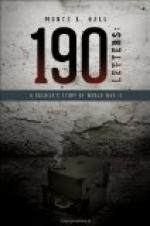Monday, December 7.
MY BELOVED MOTHER,—I am writing this in the night . . . by six o’clock in the morning military life will be in full swing.
My candle is stuck on a bayonet, and every now and then a drop of water falls on to my nose. My poor companions try to light a reluctant fire. Our time in the trenches transforms us into lumps of mud.
The general good humour is admirable. However the men may long to return, they accept none the less heroically the vicissitudes of the situation. Their courage, infinitely less ‘literary’ than mine, is so much the more practical and adaptable; but each bird has its cry, and mine has never been a war-cry. I am happy to have felt myself responsive to all these blows, and my hope lies in the thought that they will have forged my soul. Also I place confidence in God and whatever He holds in store for me.
I seem to foresee my work in the future. Not that I build much on this presentiment, for all artists have conceived work which has never come to light. Mozart was about to make a new start when he died, and Beethoven planned the ‘Tenth Symphony’ in ignorance of the all too brief time that was to be allowed him by destiny.
It is the duty of the artist to open his flowers without dread of frost, and perhaps God will allow my efforts to fulfil themselves in the future. My very various attempts at work all have an indescribable immaturity about them still, a halting execution, which consorts badly with the real loftiness of the intention. It seems to me that my art will not quite expand until my life is further advanced. Let us pray that God will allow me to attain. . . .
As for what is in your own heart, I have such confidence in your courage that this certainty is my great comfort in this hour. I know that my mother has gained that freedom of soul which allows contemplation of the universal scheme of things. I know from my own experience how intermittent is this wisdom, but even to taste of it is already to possess God. It is the security I derive from knowledge of your soul and your love, that enables me to think of the future in whatever form it may come.
December 9.
DEAR MOTHER,—P—— L——, in his charming letter, tells me he would willingly exchange his philosophers for a gun. He is quite wrong. For one thing, Spinoza is a most valuable aid in the trenches; and then it is those who are still in a position to profit by culture and progress who must now carry on French thought. They have an overwhelmingly difficult task, calling for far more initiative than ours. We are free of all burden. I think our existence is like that of the early monks: hard, regular discipline and freedom from all external obligations.
December 10 (a marvellous morning).
Our third day in billets brings us the sweetness of friendly weather. The inveterate deluge of our time in the first line relents a little, and the sun shows itself timidly.




